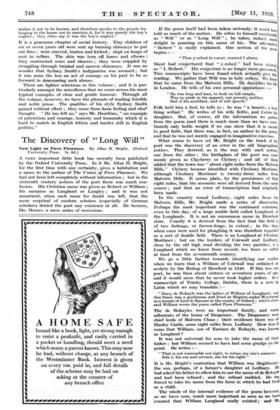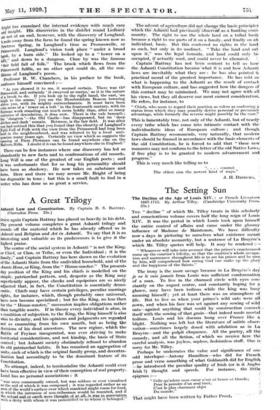The Discovery of " Long Will"
A VERY important little book has recently been published by the Oxford University Press. In it Mr. Allan II. Bright, for the first time with any certainty, gives a habitation and a name to the author of The Vision of Piers Plowman. We had not been left completely without information ; but in the sixteenth century notices of the poet there was much con- fusion. His Christian name was given as Robert or William his surname as Langland or Langley ; and it was not unnatural, when such room for doubt was left, that the more sceptical of modern scholars (especially of German scholars) denied the poet any existence at all. He became, like Homer, a mere series of recensions.
If the poem itself had been .taken seriously, it could hays
. told us much of the author. He refers to himself continually as " Will " or as " Long Will " ; he takes, indeed, much - delight in punning on this name of his. The alternative :" Robert " is easily explained. One section of the poem
begins :—
" Thus y-robed in russet, roamed I about-.
- Skeat had conjectured that " y-robed " had been misread'
as " I, Robert." His conjecture is no longer mere.guesswork Two manuscripts' have been found which actually give thir reading. We gather that Will was in holy orders. We hair that he came from the Malvern Hills. He deseribes his life in London. He tells of his own personal appea4nce :-
" He was long and lean, to look on full simple,
Was no pride in his apparel, nor poverty neither, Sad of his semblant, and of Soft speeeh."
Folk held him a fool, he tells us ; he was " a lunatic, a lean thing Withal." He writes of his wife Kitte, and, Calote his daughter. But, of course, all the information we gather
from the poem (and there is much more than we have men. tioned) only holds weight if we can show that it is meant in good faith, that there was, in fact, an author to the pout; and that he was not merely engaged in imaginative exercises. What seems to have set Mr. Bright on the track of tht poet was the discovery of an error in the old biographical notices. They derived, as is the way with such notices,
one from the other ; the birthplace of the poet was com- monly given as Clayberry or Clybery ; and all of them added that the town was " about eight miles from the Malvern Hills " Clybery became identified with Cleobury Mortimei, although Cleobury Mortimer is twenty-three miles froia Malvern Hills. It seems plain, by the persistence of that eight miles, that the accounts were all derived from the same
source ; and that an error of transcription had originally been made.
In the country round Ledbury, eight miles from the
Malvern Mr. Bright made a series of discoveries.
Perhaps the most important was the continued existence, even 'to this day, of a large arable field called Longland, or the Longlands. It is not an uncommon name in Hereford- shire. Usually it is derived from the fact that the field is of two furlongs, or furrow-longs, in extent ; in the days
when oxen were used for ploughing it was therefore regarded as a sort of double field. There is no Longhand at Cleobury Mortimer ; but on the borders of Colewall and Ledbury, close by the old high road dividing the two parishes, is a Longland which we know from recordi has been so called
at least from the seventeenth century.
We go a little further towards identifying our author
when we learn that a William of Colewall was ordained an acolyte by the Bishop of Hereford in 1348. If this was our poet, he was then about sixteen or seventeen years of age, and it would seem that he never took higher orders. hi a manuscript of Trinity College, Dublin, there is a note in
Latin which we may translate :—
" Stacy de Itokayle was the father of William of Longland ; and this Stacy was a gentleman and lived at Shipton-under-Wychwood as a tenant of Lord le Spenser in the county of Oxford ; which alma. said William wrote the poem called Piers Plowman."
The de Rokayles were an important family, and warm adherents of the house of Despenser. The Despensers were chief lords of Malvern Chase ; their residence there was at
Hanley Castle, some eight miles from Ledbury How does it come that William, son of Eustaee de Rokayle, was known as Langland ?
It was not universal for sons to take the name of their father ; but William seemed to have had some grudge on the point. He writes :- "Thetis not reasonable nor right, to refuse my sire's surname, Sith I, his son and servant, sue for his right."
It is Mr. Bright's contention that' William was illegitimate; the son, perhaps, of a farmer's daughter at Leclbury. lie had asked his father to allow hiruto use the name of de Rolm*
and had been refused ; and the refusal rankled. He sM forced to take his name front the farm in which he had lived
as a child.
The whole of the internal evidence of the poem becomes, as we have seen, much more important as soon as we have "granted that William Langland really existed ; and Mr. Bright has examined, the internal evide with much .eare ukt insight. His discoveries in the Ledbririr ire not at an end, however, with the discovery of Longland. Cagle away from the farm he found the spring known now as kg/tress Spring, in Langland's time as Promeswelle, or priineswell. Langland's vision took place " under a broad bank, by a burn side." He looked up to a " tower on a ttlft," and down to a dungeon. Close by was the famous r.&ir field full of fcilk." The brook which flows from the primeswell fulfils, as no other spot could do, all the con.-
&ions of Langland's poem.
Professor R. W. Chambers, in his preface to the book, confesses himself convinced :—
"As you showed it to me, it seemed certain. There was the Primeswell, and certainly it sweyved so merye,' as it is the nature d a brook to do. If you look up to the right hand, the east, 'an leigh to the !inane,' you see the Herefordshire Beacon towering above you, with its mighty entrenchments. It must have been sin more of a ' tower on a toft ' in the fourteenth century, with its Norman work standing out much more boldly than, after so many centuries of denudation, it does now. There is the vale beneath ; the ' dungeon '—the Old Castle—has disappeared, but its ` deep ditChes and dark' remain. Between, is the fair field. It was after rn had noticed this that you found that the identity of Langland's '-teld Full of Folk with the view from the Primeswell had long been held in the neighbourhood, and was referred to by a local anti- quarian many years ago. Certainly no view which so suggests the opening of Piers Plowman can be found anywhere else on the Malvern Hills. I doubt if it can be found anywhere else in England."
There can be few instances where one discovery has led so abundantly to new facts and to confirmations of old records.
Long Will is one of the greatest of our English poets ; and it was unfortunate that for so long his personality should have been so shadowy. He now takes on substance and foim. Here and there we may accuse Mr. Bright of being tee dogmatic in tone ; but this is a small fault to find in a
writer who has done us so great a service.











































 Previous page
Previous page